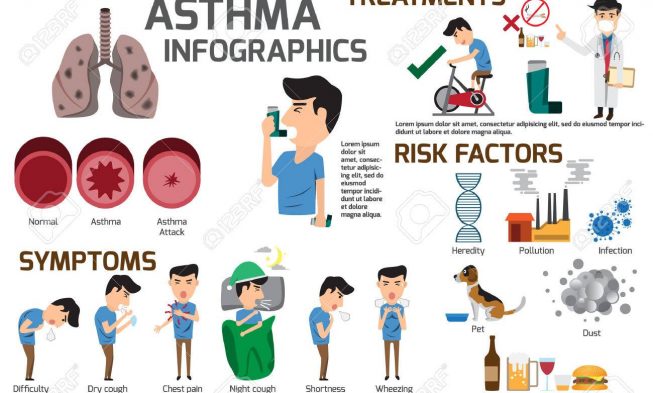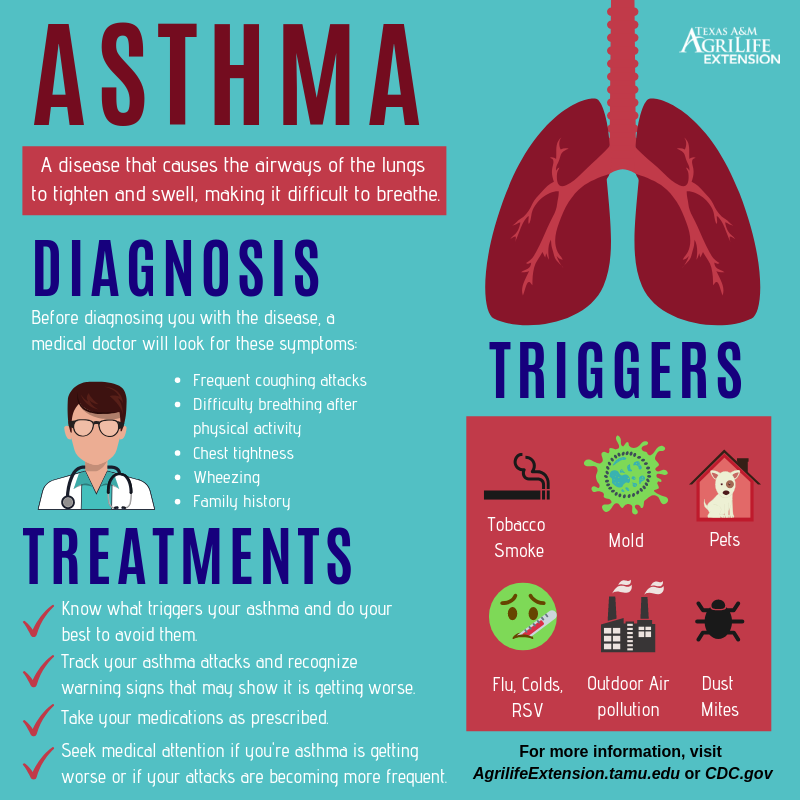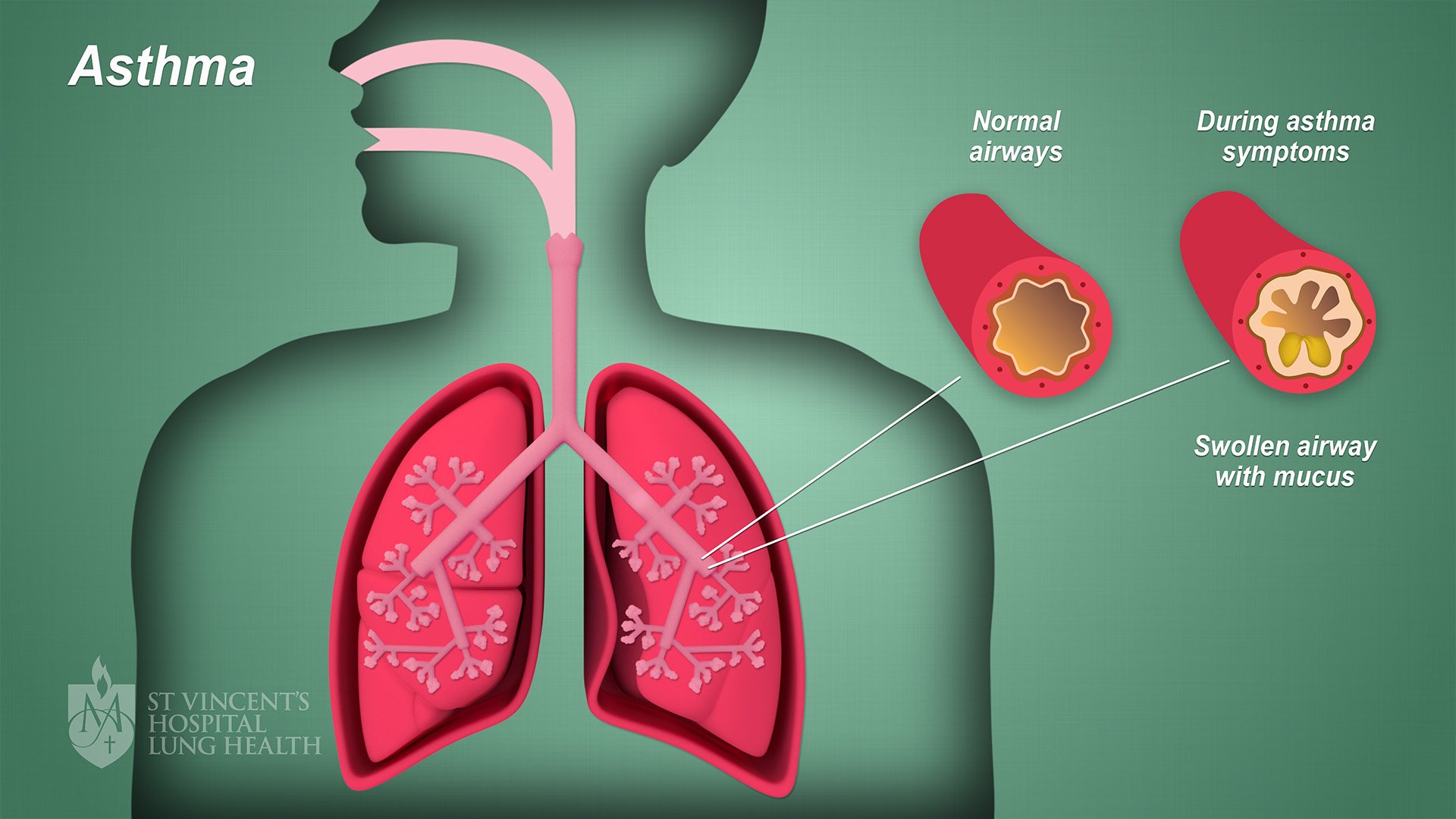Minimizing Environmental Asthma Triggers At Home And Work
You can take measures to keep your home asthma-friendly by identifying and minimizing common indoor asthma triggers, such as pet dander, mold, dust mites, chemical irritants , and cigarette smoke, advises the Environmental Protection Agency. Some smart strategies for managing asthma triggers include designating pet-free zones in the house , washing bedding and mopping and vacuuming frequently , and putting dust-mite covers on pillows and mattresses.
If youre experiencing asthma symptoms at work, speak with your supervisor and coworkers to try to identify the triggers it could be anything from moldy carpets to dust to industrial cleaning chemicals and then figure out a way to minimize your exposure.
Managing Your Chronic Asthma Condition
No one should be in denial about having asthma. Ignoring the condition can mean living with uncontrolled symptoms, frequent asthma attacks, and complications. Controlling asthma may reduce the need for certain asthma medications. The following steps can be taken to help you cope better with living with asthma:
What Is An Asthma Action Plan
Your healthcare provider will work with you to develop an asthma action plan. This plan tells you how and when to use your medicines. It also tells you what to do if your asthma gets worse and when to seek emergency care. Understand the plan and ask your healthcare provider about anything you dont understand.
Recommended Reading: Severe Eosinophilic Asthma
Medications That Relieve And Control Symptoms
Based on your asthma symptoms, your health care provider will prescribe asthma medications designed to work best for you. The two main types of asthma medications are:
Quick-Relief Medication Everyone with asthma should have access to quick-relief medication delivered with a metered-dose inhaler. Your quick-relief medication is used to treat asthma symptoms when they first begin. Within 10 to 15 minutes of use, your quick-relief medication should work to reduce squeezing of the muscles around your airways. If you are prescribed a quick-relief asthma inhaler, you should carry it at all times.
Long-term Control Medication This type of medication is taken daily and works to reduce your airway inflammation and mucus production. This makes your airways less sensitive to triggers and prevents asthma flare-ups before they happen. Not everyone with asthma needs a long-term control medication. Your healthcare provider will determine your asthma severity and whether you need one.
There are several different asthma medication delivery systems. If you take inhaled medicines, you should practice using your inhaler at your health care providers office. If you take long-term control medicines, take them daily as your health care provider prescribes. Your health care provider may also advise you to use a peak flow meter to measure and record how well your lungs are working.
Oral Corticosteroids in Asthma Care
Managing Daily Life And Complications Of Asthma

Theres no one-size-fits-all approach to managing asthma. For some people, asthma can be a minor inconvenience for others, it can be a serious, even life-threatening condition. Some people may experience asthma symptoms only occasionally in response to specific triggers, while others may have symptoms that are frequent and severe enough to interfere with daily activities. There are also different types of asthma, such as allergy-induced asthma and exercise-induced bronchoconstriction , which is asthma thats triggered by physical exertion.
RELATED: Everything You Should Know About Severe Asthma
Recommended Reading: What Causes Increased Mucus Production In Asthma
Invest In An Air Purifier
We recommend buying an air purifier not only because were an air purifier company but because it helps a ton. Indoor air is 3-5 times more polluted than outdoor air. Our True HEPA air purifiers can filter up to 99.99 percent of airborne particles down to 0.1 microns, removing irritants and providing you and your child with clean, fresh air.
Alen BreatheSmart FLEX Air Purifier for Asthma From $364
Little Airways Big Voices
The Little Airways, Big Voices initiative aims to bring the voice of families impacted by asthma in childhood to the forefront of drug development and research. The Allergy & Asthma Network, American Lung Association, American Partnership for Eosinophilic Disorders, and Asthma and Allergy Foundation of America are collaborating on this initiative. To learn more, visit littleairwaysbigvoices.org.
Recommended Reading: Really Bad Asthma
Other Things Play A Role
Lists of good and bad places to live with asthma often include a look at other things like:
- Poverty: More people living in poverty means fewer people with access to medical care.
- Lack of insurance: Again, it means fewer people with asthma will be getting care.
- Number of asthma doctors: Without enough specialists, people who canât travel easily wonât get care.
- Number of ER visits: A high ranking means people arenât seeing a doctor regularly.
Managing Stress And Asthma
Stress and anxiety can trigger asthma symptoms, and in turn, uncontrolled asthma can increase stress and anxiety. By managing stress through therapy, breathing practices, and other relaxation techniques, people with asthma can reduce their risk of having a stress-induced asthma attack or episode. Studies show that mindful breathing and observation can reduce stress and enhance overall health, according to the AAFA.
Read Also: Does Chihuahuas Help Asthma
Managing Mood Disorders And Asthma
Research shows that both depression and anxiety are complications that can develop as a result of having uncontrolled asthma. A study from Korea published in the May/June 2017 issue of the journal Allergy and Asthma Proceedings found that people with asthma were almost twice as likely to develop depression compared with those who didnt have asthma.
Stress can exacerbate asthma, notes Grayson. If stress, anxiety, or any emotional concerns are interfering with your life or relationships, you should ask your doctor about whether it might be appropriate to see a mental health professional. Mental health concerns, like depression or anxiety, may also interfere with asthma medication and treatment plan adherence, Grayson adds. Those issues should be addressed so the asthma can be better managed.
How Do Healthcare Providers Diagnose Asthma
Your healthcare provider will review your medical history, including information about your parents and siblings. Your provider will also ask you about your symptoms. Your provider will need to know any history of allergies, eczema and other lung diseases.
Your healthcare provider may order a chest X-ray, blood test or skin test. Your provider may order spirometry. This test measures airflow through your lungs.
You May Like: How To Make A Homemade Inhaler For Asthma
Ways You Can Prevent And Treat Attacks
Asthma is a common lung condition that affects your airways . It is a long-term condition with currently no cure, but that doesnt mean you should let your asthma control you.
Fortunately, there are many simple and effective ways to treat and manage your or your childs asthma. In the UK, 5.4 million people are currently receiving treatment for asthma which is 1 in every 12 adults and 1 in every 11 children. However, as well as medicines, there are many things you can do to control and alleviate your symptoms so that you can live a normal life. Keep reading to learn about tips on how to live with your asthma with euroClinix.
Asthma In Older Adults

Asthma is common in adults 65 and older. It is often missed or untreated in this group. Other health problems may make it hard to diagnose asthma. More asthma-related illness and deaths occur in older adults than in other age groups. Regular communication with your doctor is key to managing asthma.
Recommended Reading: Does Weight Gain Make Asthma Worse
Breathe Well Live Well With Asthma
At Asthma Australia, we want all people with asthma to breathe easy and to live a full and uninhibited life. Living with asthma, this is possible if the correct management is in place. Managing your asthma means taking control of your health. It means working with a doctor and medical professionals to determine an Asthma Action Plan, and using it every day. Find out more about Asthma Action Plans here.
It means prevention and reliever medications and your asthma are balanced, so the asthma is under control. And that means there are few symptoms or flare-ups, also known as asthma attacks.
If you or someone around live with asthma, make sure you know what first aid to apply and what medications are necessary. Take medical advice. Some companies or organisations that promote complementary medicines do not have an evidence base. Use proven medicines in consultation with your doctor.
Some times of life require extra care. Correct asthma management is critical for children and young people with asthma and during pregnancy.
For now, there is no cure though we are supporting research to try and help this.
Setting The Stage: Diagnosis Of Asthma
To set the stage for an audience, it is important to share some background to the story and gain insight and perspective. For some, a diagnosis of asthma is the beginning of a journey. It can mean finally understanding the symptoms you have been experiencing, finding answers, new treatment possibilities, introductions to new doctors, and possibly the beginning of some lifestyle changes. A diagnosis can be validating, scary, joyous, or a combination of many emotions depending on each persons unique situation.
Also Check: Asthma Symptoms From Allergies
Complementary And Alternative Medicine For Asthma
Some complementary or alternative therapies may help with asthma management. They include breathing techniques, yoga, meditation, acupuncture, caffeine, and dietary supplements, such as vitamin D. Theres also some evidence that certain teas, such as licorice, fennel, eucalyptus, and green and black tea, may have some beneficial effects on lung function and may be good for people with asthma.
Other complementary and alternative medicine approaches that have been touted as being helpful for asthma but dont yet have solid scientific evidence to back them up include Himalayan salt lamps, essential oils, and accupressure.
RELATED: Can Apple Cider Vinegar Help Asthma?
If you want to try some complementary and alternative therapies for asthma, make sure you talk to your healthcare provider first. Some supplements may interact with your medications or cause health problems, and just because something is promoted as natural, it doesnt mean its safe, advises the National Center for Complementary and Integrative Health. Never use complementary therapies as substitutes for the conventional asthma treatments prescribed by your doctor.
Identify And Avoid Triggers
Having asthma means your airways are always more inflamed than those without asthma, meaning you are more sensitive to certain triggers. Some common triggers include: smoke fumes , animal fur, pollen as well as other allergens. Some triggers can be more difficult to identify, but keeping a diary of all your activities in a day can help you in mapping your triggers to your reactions.
Although taking your preventer inhaler every day is the best way to keep your asthma in-check, some common triggers can be controlled with simple solutions. For instance, if one of your asthma triggers is cold weather, you should do your best to keep warm and dry to prevent a flare up during the winter months. Similarly, if one of your triggers is pet fur and youre visiting the house of someone you know has a pet, you could take an antihistamine before leaving.
Sometimes triggers are unavoidable, but having a plan of action for when you cant avoid them can reduce the risk of a reaction. Your GP or asthma nurse can help you with coming up with a plan for your triggers, some people with severe allergic asthma may benefit from seeing an allergist – someone who specialises in allergy treatment.
Recommended Reading: Joining The Navy With Asthma
What Is The Best Way To Live With Asthma
The key to good living with asthma is developing a strong partnership between patients, caregivers, and physicians. Practical steps include the following:
Make an asthma care management plan with your physician. An asthma management plan helps you understand what to do when specific situations arise. Each time you visit the physician, talk about your plan, and make any necessary changes.
Educate yourself. Stay informed about the latest developments in asthma and allergy care and treatment. Ask your physician about new medications or research findings that may relate to your care.
Get regular medical care. If you have asthma, you should see your physician at least once a year, even if your symptoms are under control. When you become sick, or if you have significant changes in your health, you should also talk with your physician about how your asthma could be affected.
Take your medicine. Your asthma medications will make you feel better and sometimes people think thats the time to stop. Its not! Use your medications as prescribed.
With good management, asthma symptoms can be controlled. Most people who develop adult onset asthma are able to lead normal lives. Expect success!
Managing Your Work Life With Asthma
Asthma can affect your ability to do some jobs and work in certain environments. But it shouldnt stop you from doing your job.
According to the American Academy of Allergy, Asthma, and Immunology , as much as 15.7 percent of all asthma in adults is work-related. Any number of things youre exposed to every day at work may trigger symptoms, including cleaning products, paint, dust , mold, insects, and cigarette smoke.
If you are experiencing asthma flares at work, the AAAAI advises working with your doctor and employer to identify your triggers and take measures to avoid your exposure as soon as possible, since long-term exposure to allergens could lead to permanent lung damage.
Let your supervisor know if youre experiencing a problem, says Grayson. They may be able to take measures, like asking coworkers near you not to wear strong perfumes if thats a trigger, finding alternative chemicals or materials, ventilating your workspace, or eliminating sources of mold.
The Americans with Disabilities Act is a federal law that gives people with disabilities the right to ask for accommodations in cases where policies, practices, or conditions leave you at a disadvantage . The ADA mandates that employers must make reasonable accommodations to allow employees to work safely, though in some cases, there may be limited options, Williams explains .
Also Check: I Have Asthma Can I Smoke Weed
How To Live With Your Asthma
Asthma can be a stressful and a debilitating condition, but anyone suffering from the effects of asthma can take comfort knowing that many people successfully manage their asthma on a daily basis. Even if you suffer from severe asthma, there are many steps you can take to dramatically improve your condition. As always, consult a physician or asthma specialist to learn more about living with asthma.
Here are a few steps you can take to manage your asthma:
1. Keep Your Home Clean
For asthma sufferers, a vacuum can become your best friend. Keeping your home clean will help eliminate allergens and pollutants from the air that can cause your asthma to flare up. It is preferable to remove carpets from the bedroom if possible. Dust mites, pet dander, mold and other irritants can become trapped in poorly maintained carpet. Get in the habit of vacuuming 2-3 times a week, changing sheets and pillowcases often, and getting your carpet professionally cleaned once or twice a year. If possible, the person with asthma should not be in the room while vacuuming, as it creates clouds of dust in the room.
2. Know Yourself and Your Triggers
3. Enroll in an Asthma Management Program
Medication Prices For Asthma

In a report published in in the Annals of the American Thoracic Society, researchers tabulate the annual medical cost of living with asthma as $3,266 per person. That amount includes costs for prescriptions, office visits, hospitalizations, and emergency room care, based on cost estimates from the Centers for Disease Control and Prevention.
If the cost of your asthma care is a concern, talk to your doctor about your options. Your doctor may be able to suggest ways to help, such as where you can apply for patient assistance programs, how to find manufacturer coupons, and more.
You May Like: Does Weight Gain Make Asthma Worse
Ranking Cities For People Who Live With Asthma
Because of the connection between the environment and asthma, some organizations attempt to rank certain cities or regions as being favorable or not for those living with asthma. For example, the Asthma and Allergy Foundation of America looked at the largest 100 urban centers in the U.S. to create a list of the most challenging cities to live in with asthma. The AFAA examined 13 separate factors, including occurrence of asthma, healthcare visits, and environmental factors.
The most recent list is from 2015. In that list, the AAFA noted that these were the five most challenging cities for people with asthma:
- Memphis, Tennessee
- San Jose, California
- Abilene, Texas
However, the AAFAs list is limited because it only looked at the 100 largest cities. In general, dense, urban centers can be challenging for some people with asthma due to higher levels of air pollution from traffic and other sources.
Whats more, your individual experience of asthma wont be exactly like that of someone else living in your neighborhood, let alone another part of the country. In order to assess how living in a particular community might affect you, it may be more helpful to look at common triggers and how each city ranks for each one.
